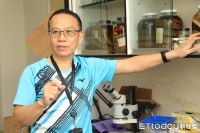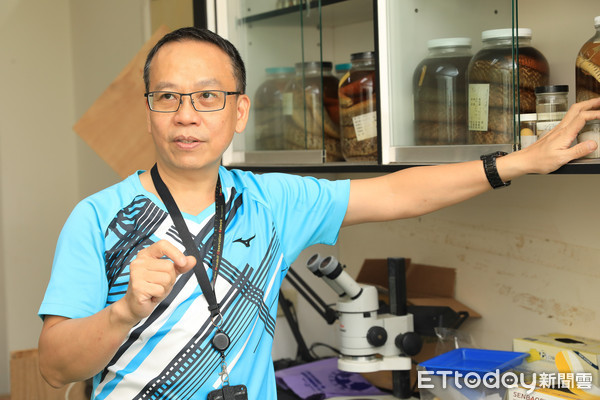Roadkill Club gets a helping hand from “Green Inside Project,” marking success in its ten-year journey (ETtoday News Cloud Report)

2021/08/31
Roadkill Club gets a helping hand from “Green Inside Project,” marking success in its ten-year journey! Founder Te-En Lin: “Every death is a message!” Inviting corporate investment to improve the environment

Reporter: Chang Hui-Yuan / Reporting from Nantou
The public’s awareness of environmental protection has increased rapidly in recent years – not only in terms of personal life, but also in the practice of corporate social responsibility – and this in turn will affect willingness to consume. Extreme weather has prompted many companies internationally to invest in various environmental issues. The power and strength of enterprises shall team up with non-governmental organizations to find ways to operate that are environmentally friendly and sustainable. TAYA Group, a leading brand of energy connection, has established the TAYA Pristine Homeland Foundation organization and furthermore has organized a “Green Inside Project” activity starting from 2009. Every year, it conducts selections for different environmental issues to support talented individuals and actions that are dedicated to environmental friendliness.
The “Roadkill Club” (Taiwan Roadkill Observation Network) devotes attention to the frequent occurrence of wild animals becoming “roadkill,” calling on the public to participate in the uploading of scenes of wild animals being killed on the road. From there, professors and expert groups will identify the species and their causes of death to understand the threats faced by wild animals and improve the current roadkill situation through the accumulation of a large amount of data and records. Ta-En Lin, the founder of Roadkill Club, has said: “Every death is a message.” As a researcher at the Endemic Species Research Institute observing wild reptiles, Ta-En Lin found that the number of live snakes seen outside was much lower than the number of dead snakes, with a gap of up to ten times. This also became an opportunity for him to set up Roadkill Club. “Many animals that are killed on the road were pregnant or were accompanied by their young.” He thus found that the reproductive needs of many animals needed to be taken seriously.
The process of recording instances of roadkill has highlighted how many wild animals face ongoing threats due to a lack of effective protection or due to destruction of their habitats. Moreover, once a species is endangered, this is a warning sign of ecological imbalance. By appealing to the general population, Roadkill Club has gathered increasing volumes of information and has thus also gained in popularity. “They also use records of roadkill hotspots by roads to list out species that are threatened and seasons when roadkill instances are common, while promoting the participation of all individuals in scientific investigations. “Roadkill Club also now cooperates with navigation systems to indicate roadkill hotspots and time periods in the system. When these two conditions occur simultaneously, the navigation system will provide voice reminders and warnings.” Ta-En Lin explained. This was originally a group formed by a few friends in their spare time, but in the ten years since its establishment, its scale has grown ever larger. “You need funding if you want to do more. Take, for example, the Green Inside Project and the Delonix Regia Forum, which are regularly organized every year by TAYA Pristine Homeland Foundation. Compared to relying solely on government subsidies or on online communities, the actual participation of enterprises is more powerful in terms of resources and social attention.
One time, after a chance meeting, Ta-en Lin learned information about Green Inside Project. After lengthy consideration, he decided to enter the selection. In 2014, he won the Special Prize for Southern Spirit award, and this also marked the first time that an online club had won the award. “Most of Roadkill Club’s observational data are collected in low mountainous ecological areas. This also happens to align with the Delonix Regia Forum’s emphasis on the Satoyama spirit of the ‘symbiosis of man and nature.’” The Green Inside Project offered this explanation when announcing the award for Roadkill Club. In regard to Roadkill Club’s award, Ta-En Lin pointed out: “The Green Inside Project is actually an exchange of entities taking action. There was no financial support at the beginning, but after winning the award, at least there will be funds to do more things. We are grateful to TAYA for the great importance it attaches to groups that have long been engage in environmentally friendly work. This can allow Roadkill Club to continue to implement the concept of sustainable operations while also increasing its exposure.” He also encountered participants on different topics while participating in the selection process, and this led him to sigh over the strength of popular power. In the process, he not only made many good friends, but also had opportunities for interdisciplinary integration, making it easier to see the issues of mutual concern.
Established ten years ago, Roadkill Club was initially focused only on the current problem of wild animals being killed on the road. Since 2013, it has also incorporated other sideline concerns such as disease monitoring and environmental drug monitoring surveys. “If an animal’s cause of death is not immediately apparent, we will conduct tests to discover any latent diseases or whether certain seasonal environmental drugs are being over-used and are leading to the deaths of wild animals.” Ta-En Lin explained, “Actually, it can be said that it was the ferret-badger that changed the fate of Roadkill Club.” The rabies virus was first discovered in ferret-badgers in 2013, and this made many people and epidemic prevention agencies aware of the importance of dead animals. This incident also led the Bureau of Animal and Plant Health Inspection and Quarantine to begin monitoring various diseases that may be hidden in wild animals, and even achieved the result of “advanced deployment.”
This incident inspired willingness to participate among more people as schools, institutions, and conservation groups joined the disease monitoring program one after another. The output of Roadkill Club has also been recognized and fully supported by the Endemic Species Research Institute, allowing Ta-En Lin and Roadkill Club to go on for the subsequent ten years. He also said that “Citizen Science” has now entered phase 3.0, and in the future, the club will enter the community to understand people’s needs and discuss their concerns together. The most important thing is to establish an industrial chain, in the hope that companies can provide more than just monetary donations. If we can combine application and resource sharing in product development, a positive cycle can be formed in society. This could include cooperation with companies that focus on sustainability issues, like the TAYA Group; or it could involve the design of enterprises and products in different types of industries so that environmentally friendly thinking can be introduced. For example, a device that can automatically sense wild animals could be added to automobile production processes, to effectively reduce the occurrence of roadkill instances. Furthermore, an optimal reward system could be established to give back to consumers, so that the public can effectively participate in the practice of “Environmental Good.”
Original source: https://finance.ettoday.net/news/2053270?redirect=1

